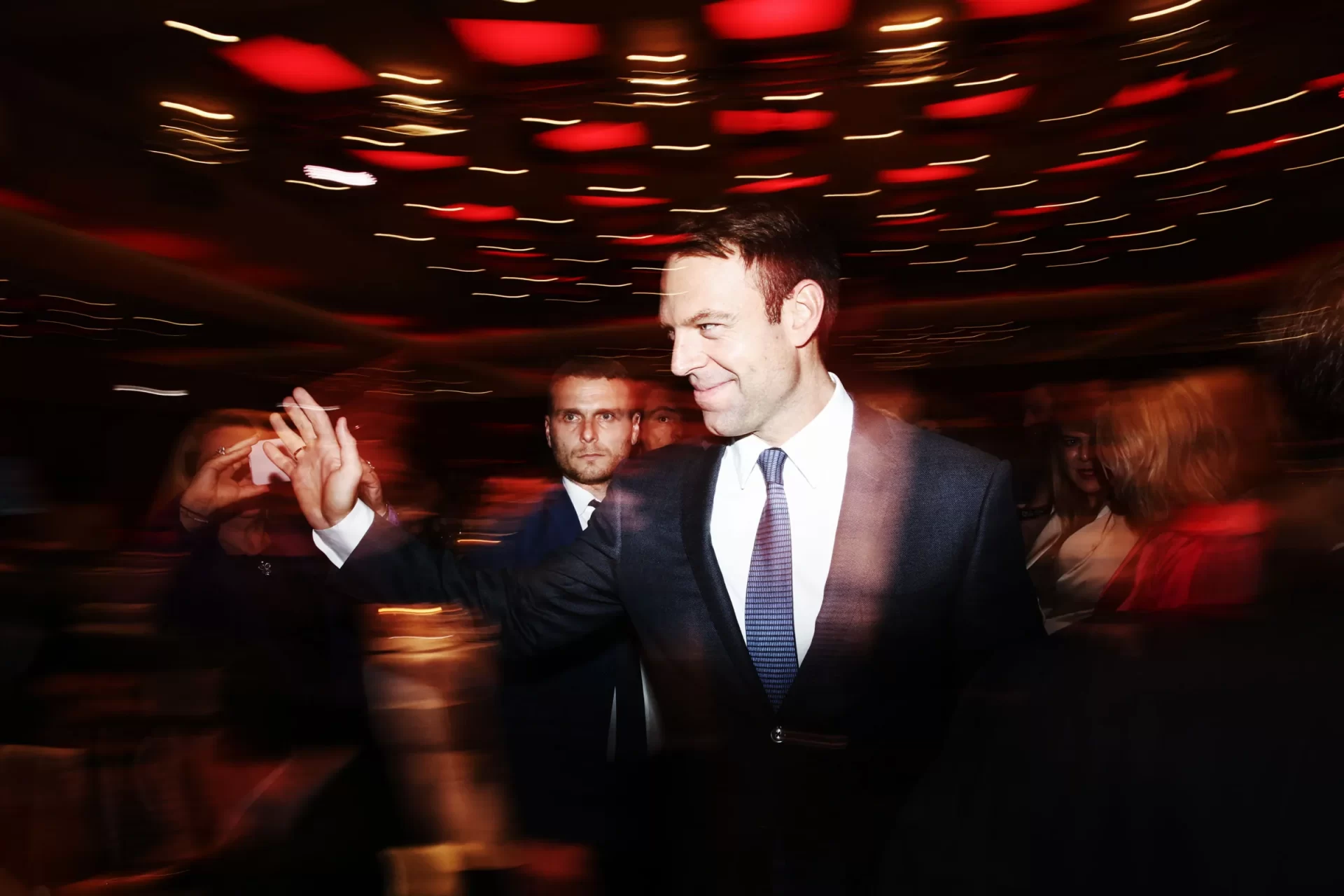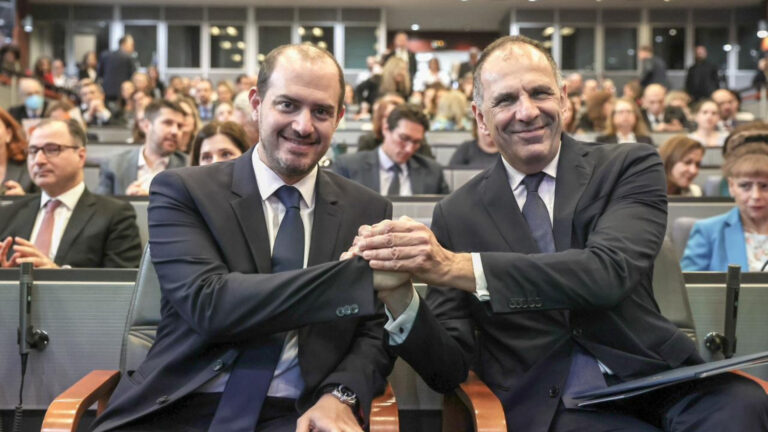Stefanos Kasselakis is the darling of the country’s media, with a celebrity status forged on social media. But how much of his carefully crafted image is real?
On the night that Greece’s biggest left-wing party voted for its new leader, all anyone could talk about was pizza. At stake was the future of the Syriza party, which had run Greece at the head of a coalition government from 2015 to 2019. As the votes came in on September 19, one of the candidates, Stefanos Kasselakis, was holed up in his campaign headquarters. Over the previous few weeks, Kasselakis, a former Goldman Sachs associate and shipowner, had emerged seemingly from nowhere to become the frontrunner, and journalists were camped outside his office. As the evening drew on, his team ordered pizzas. Kasselakis—young, handsome, sporting carefully combed hair and wearing a shirt open at the collar with rolled-up sleeves—came down to the lobby with his partner, Tyler McBeth, to collect the pies in person. Later, he returned to hand out a few pizzas to the journalists.
The press ate it up—not just the pizzas, but the theater of it. As the leadership race rolled toward its conclusion, the pizza delivery story was at the top of Google search results for Kasselakis’ name. The incident is emblematic of his campaign, which catapulted him onto Greece’s political scene over a matter of weeks. He used a mastery of TikTok, Instagram, and X to create an unexpected buzz around a previously anemic leadership race and rise to the top tier of Greek politics. Political experts say this ascent points to a new—possibly alarming—phenomenon in European politics. His candidacy sidestepped the normal course of public discussion, using social media platforms to project, even create, a tailored image as he ran a campaign more akin to entertainment than politics, eschewing substance and meaning for the tools of a digital influencer.
Kasselakis’ campaign began with a four-minute and 21-second video posted on his social media accounts on August 29. Staring directly at the camera, he told his story as a self-made entrepreneur, returning from overseas to build a new Greek left. He appealed to Greece’s young people, 220,000 of whom moved to more advanced economies during the economic crisis, and to their families, who saw in him the successful émigré they hope their children will become, said Papachristou. Kasselakis personified the Greek dream and vowed to bring it to the people. He noted that his credentials include winning mathematics competitions, his degrees (from Donald Trump and Elon Musk’s alma mater, the Wharton School at the University of Pennsylvania), and his fluent English.
That day, Greek social media threads and dinner tables were ablaze with discussion. “Where did this guy come from? Maybe he is a stooge from the ruling right wing or the Americans. Do you think he is for real?” my friends asked when we gathered to watch the August supermoon that evening.
Kasselakis didn’t speak much about policies, but his message resonated with a public tired of political families and the ruling elite, particularly the shipping class—that small group of mostly family-run businesses that retain a significant influence on Greek public life. His opposition, fresh off their summer holidays, did not have time to respond. An estimated 40,000 people signed up to join Syriza after Kasselakis announced his candidacy.
Before the launch, Kasselakis had carefully scrubbed his earlier social media presence, according to Panagiotis Papachristou, a strategic communications advisor at 4Hats agency in Athens. Posts from Kasselakis’ friends indicated that he had been active prior to this candidacy, but none of his content was available. His only two remaining Instagram posts prior to 2020 are about his dog.
From then on, Kasselakis’ team ran a highly professional campaign. Little information about the team is available online, and Syriza did not respond to requests for comment. According to Papachristou, the campaign team created events every 16 to 24 hours through social media, and these were then picked up by the mainstream press to be disseminated to a larger audience every news cycle. These featured lifestyle pieces and appearances at key locations or events, but without a “deeper political agenda,” he says. All of it created an image of a “fresh person who has something deeper to say, even though he hasn’t said it yet.”
The campaign team was made up of “non-professional volunteers,” most of them young people, with Kasselakis taking care of strategic direction, says Evgenia Κountouri, who was part of Kasselakis’ press office. Many of the videos of him talking to the camera and responding to criticism were shot by his partner, McBeth, at their home, she says.
During his campaign, Kasselakis went everywhere with his partner, stirring talks about their relationship in a country that has yet to legalize same-sex marriage. He made a video at Makronisos, an island where communists were imprisoned during the dictatorship of the 1960s and 1970s, leading some to accuse him of exploiting history. Whenever he faced criticism, he posted videos of himself directly responding to the allegations and avoided long-form interviews with major publications. It was a campaign run on symbolism rather than ideology or manifestos—a “fortune cookie” campaign, thick with political clichés, Papachristou says. Kasselakis somehow managed to spin an image of homespun authenticity and portrayed himself as a self-made outsider coming to fix Greece’s political left. The image didn’t always stand up to scrutiny.
Kasselakis neglected to mention his business connections with the Nomikos shipping family, which manages a fleet of 42 vessels worth close to $1 billion under the firm A.M. Nomikos. Not only are their businesses tied, but shipping magnate Markos Nomikos and Kasselakis are related, according to Greek media, linking leftist Kasselakis to a sector that represents powerful vested interests that have long rule the country’s politics and business. He has hinted that unnamed dark forces took down his family business through “extrajudicial” processes that destroyed his father’s wealth, but he angrily refused to elaborate when confronted in a TV interview. He said he quit Goldman Sachs, but local media outlets have reported that he was fired for low performance. He has denied that claim. In person, “he doesn’t have the same smoothness with reporters that you see on video. He is still somewhat reserved, even though he tries to be relaxed,” says Eleni Grigorovich, a reporter who covers politics at Greek newspaper Proto Thema.
When asked about the celebrity aspect of Kasselakis’s campaign, press officer Kountouri says this was more a reflection of how the media covered him than what he was trying to present. She adds that the allegations of half-truths by Greek media can be explained by the fact that Greece is the lowest-ranked EU country for press freedom, according to Reporters Without Borders, implying that partisan newspapers were out to get him.
Social media was vital to winning the election. By taking advantage of virality, memetic culture, and news cycles, Kasselakis was also able to create awareness of his person and persona, a critical ingredient in the stardom of someone previously unknown to the Greek public. Unlike other celebrity politicians in Greece and abroad, Kasselakis wasn’t already known for his work in cinema, music, or reality TV. His viral success on social media platforms, and consequently mainstream media, was absolutely synonymous with his rise to fame. These unmediated forms of communications make it easy to “control” the narrative, says Anastasia Veneti, associate professor in political communication at Bournemouth University. “Once you are exposed to mainstream media and journalists start asking questions, it is much harder to control the story,” she says. Platforms, particularly TikTok and Instagram, afforded Kasselakis the ability to convey spontaneity and authenticity, even if that was far from the truth.
Using the TikTok veneer of intimacy, Kasselakis was able to launch a political career based on a curated—some might say, fictionalized—version of himself. Just like the truncated cycles of internet stardom, Kasselakis was rapidly elevated by something Veneti calls “politainment,” the merger of politics and entertainment. Mid-morning shows that usually target stay-at-home housewives with recipes and celebrity gossip joined political journalists in reporting how he took his coffee; they asked delivery drivers what pizza he ordered and how much he tipped. He was covered as a celebrity figure rather than a political one.
Veneti worries that Kasselakis’ success could lead to a feedback loop in which politicians move away from traditional political discourse and electorates become more entrenched in entertainment over substance. Kasselakis used parts of the Trump populist playbook—as a newcomer addressing the electorate directly and constantly enticing reporters with his personality—although with less political talk. In a 45-minute speech announcing his candidacy for the Republican party, Trump started off by mocking his opponents and went on to talk at length about immigration, Iraq, Obamacare, and China, among other hot-button issues. Kasselakis’ lack of substance harks to a future in which politicians are “so reliant on communications, they train future audiences to choose their leaders based on these communications” rather than the effects such leaders will actually have on voters’ lives, she says.
Still, for Kasselakis to be successful, he must demonstrate political substance or his campaign will flare out, particularly in the national elections, says Veneti: “Politainment is a double-edged sword.”
Kasselakis has yet to translate his social media buzz into electoral results. Even though he won the party leadership with 56 percent of the vote in September, the results of local elections in October didn’t reflect his newfound popularity. The election of a new leader with such celebrity would be expected to rally the electorate in the subsequent vote, says Veneti. Only one of 13 administrative regions elected a Syriza-backed candidate, which suggests that Kasselakis stands on “flimsy ground,” says George Pleios, professor of social theory and mass communication at the National Kapodistrian University of Athens. The positive buzz around Kasselakis can “easily turn negative,” he said.
Source: Wired







